How Lena Rozvadovska fights for children. Story 1: Alyosha and Co
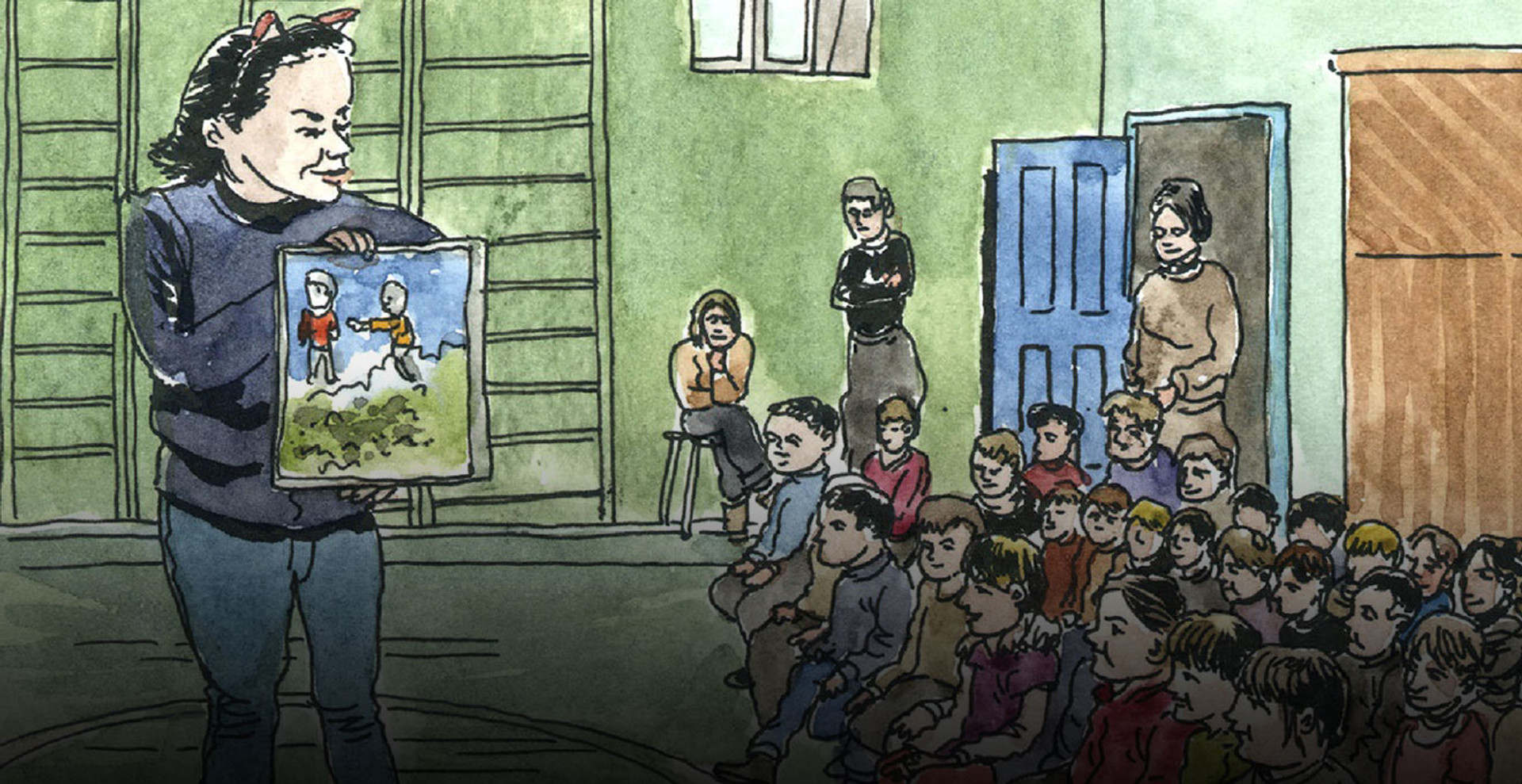
Lena Rozvadovska has been living in Slovyansk for a little over two years. She travels to the frontline and talks to the children. She calls herself a volunteer, because she has to call herself something.
At the end of 2014, Lena still lived in Kyiv and worked as a spokesperson for the Ukrainian President's Ombudsman for Children's Rights. In early 2015, she left her job, packed up her things, took her off-season clothes and books to her relatives, sold the rest and moved to Slovyansk. Only for a short time, it seemed then, just a month or two, until the end of the war.
"You see," Lena explains why it was necessary to do so, "in 10 years we will have a generation of Ukrainians who have grown up during war and whom no one will understand."
She wants to understand, and she has many children here. In Avdiyivka, Zolote, Zaytsevo and Krasnohorivka. And the place I was with her.
Her front-line volunteering began with her stay at a DP center, because it was free, and travel across the front line, to the hottest spots. Then it was very hot and very scary, now it's different.
She says that since then she cannot bear the so-called "stew" and the smell of diner food. Because it's also one of the scents of the war. A symbol, like plywood on windows in bombarded areas.
- One girl asked me where I hide during bombardments. And I said: nowhere, my city is never bombarded. She was very surprised and asked, "Why?" And I said: because war is not everywhere. Lena talks a lot while we travel.
Our first route is as follows: first we get a ball, then we get a cake, and then on to Vozdvyzhenovka.
In Vozdvyzhenovka there's a kid named Alyosha. Other children also live there - Vanya, Nadia, Lilya and Anton. Yesterday was Nadya's birthday, so we buy a cake/
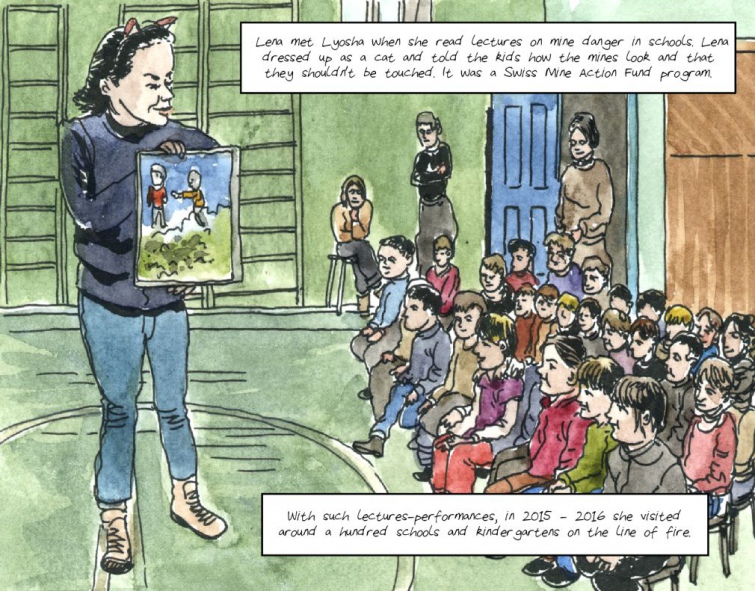 |
| © Dan Archer |
Lena met Lyosha when she read lectures on mine danger in schools. Lena dressed up as a cat and told the kids how the mines look and that they shouldn't be touched. It was a Swiss Foundation for Mine Action (FSD) program. With such lectures-performances, in 2015 - 2016 she visited around a hundred schools and kindergartens on the line of fire.
- I always asked if there were children who suffered from mines. And in Novooleksandrivka, at a school, I heard about Lyosha, who had three fingers ripped off. He found a detonator from a grenade, picked it up and it exploded. This is a brief story of how Lena and Alyosha got acquainted.
And after they met, Lena paid for Lyosha's school meals. For a year. Because Lyosha is from a large poor family. The older sisters already live separately, and there are three children still at school - Alyosha, Lilya and Anton. Lilya and Anton are still in junior school, they receive free meals, but the parents don't not have enough money for Alyosha.
- Sometimes the teachers would pay for his meals, other times some child would get sick and he would get that portion...
Then Lena and Taras Tomenko made a film about Alyosha. While filming, Lena made friends with the children.
- In the film we wanted to show the tragedy of the war on the fate of one child. So children would not get their fingers blown off. And this is a film about the fact that war knows no borders. A child can find such a detonator anywhere, - says Lena.
Vozdvyzhenovka is a small village, about 20 kilometers from the front line, but at the beginning of the war the fighting was quite close. Mines hit the gardens.
It's not something new in Vozdvyzhenovka. Not so long ago, a grenade was found on a playground in Kyiv. Look at where Kyiv is. Very far from the front line.
Lyosha has a prosthetic, but he doesn't want to wear it, it's uncomfortable. In addition, his hand is growing, and the thing gets in the way.
Lyosha learned to get by without his prosthetic, with his left hand and two fingers of his right hand.
Lyosha doesn't mention the detonator any more. He's okay. He goes to school, grazes the cows and catches fish.
- Let's put it this way: for these children the problem is not the mines but their parents, Lena explains.
This is what this story is actually about.
Vozdvyzhenovka is a village with three streets. Moonshine is made on each of them. The village is in ruin even without war.
"I want him to have a future," says Lena.
But in order to have a future a child from a drinking family must first survive.
Because there's danger everywhere. Even in the house where they live.
There is no gate, and the gate is the last supply of the poorest. If the gate is gone, it means that everything else has been sold for alcohol.
There is no toilet either.
There's plywood instead of windows. It shouldn't be a surprise after Avdiyivka and Krasnohorivka. But this is not Avdiyivka, there's no shooting here.
Alyosha doesn't have electricity, it's been cut off for non-payment.
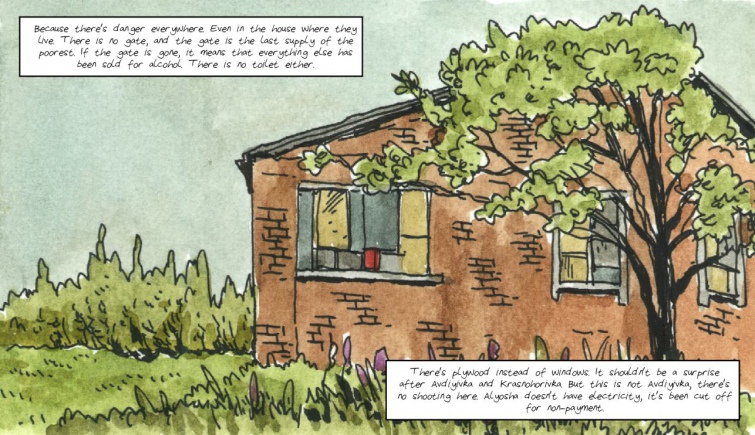 |
| © Dan Archer |
- Can you imagine what the debt was, if a large family had been cut off? - says Lena.
I ask her what can be done in such conditions. Can volunteering help if they're on the brink? What can she do for Lyosha in addition to paying for his school meals?
Lena remembers some things - notebooks, pencils, clothes, and then says she doesn't want to list trivia. Because globally that doesn't help, to help globally in such a situation you have to rip the child's roots from its environment. Strip the parents of their parental rights. What kind of help is that if the children love their parents?
- But Lyosha is not an ordinary child, he's clever, - says Lena. - I love him, and I want to watch him grow up.
She sees to it that Lyosha is not overwhelmed with gifts because of his missing fingers. He lives his difficult life, and this life forms his character. Lena likes Lyosha's character: Lyosha catches fish to feed his younger brother and sister.
- We traveled with them to Pokrovsk. I try to take all the children out to somewhere, to peaceful territory, so that they see a little bit of the world, even if it's close. We did two important things: we rode a carousel and bought a fishing rod, - says Lena.
- They need the fishing rods, not the fish: you shouldn't give them food, because they need to get food - catch fish, graze the neighbor's cows for milk...
Lena recalls how, last year, she and the children swam at the pond, barbecued sausages, played ball...
Lena and the ball. Intermezzo
We're taking a ball and some toys to Lyosha and his friends.
BBC journalists had filmed them once. Later they passed the children some gifts through Lena.
"I've had them in the trunk for two weeks now, I couldn't get to them," she says.
And I know: this is Lena. She doesn't know where the road will take her next in her search for children. Her trunk is always filled with something for everyone.
She stopped at Zolote. The children had no ball there. She gave them Alyosha's ball, and then bought another. A similar one.
She was in Zaytsevo. Edik was there.
- We play volleyball with them all the time, and now Edik is interested in soccer. We had to say goodbye to the second ball... - she says.
This is the third ball. We bought it in Slovyansk and we are taking it to Alyosha.
"You know," says Lena suddenly, "they're so cool, it's a relief to be with them..."
On the road, we talk about what can be done for children from families where parents drink. Lena has a simple formula: you become friends.
"I want to add some color to their lives, so that they can see something else, besides the drunk faces, you understand?" - she says.
We drive to Vozdvyzhenovka.
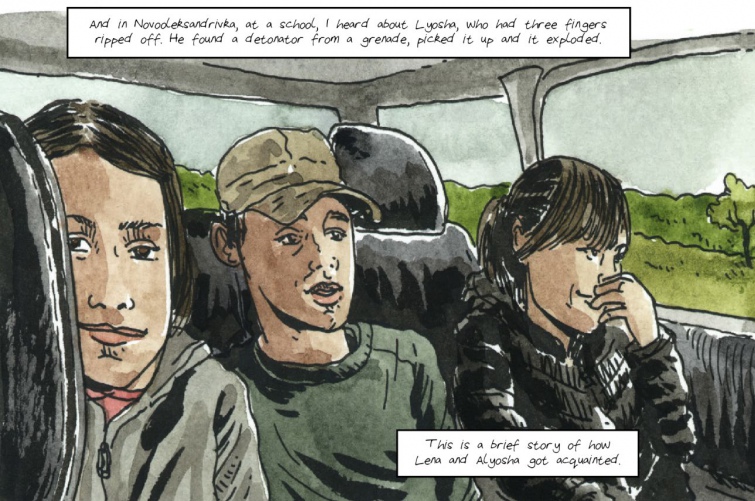 |
| © Dan Archer |
... Nadia runs out from her house with plywood windows. She is glad to see Lena, but she's upset. She was offended by a friend of her older brother who is drinking at their home. He lives with them now, because he took her father's money, a whole UAH 600, and now her dad is threatening to kill him... Nadia easily explains the cause of the conflict and its possible consequences.
Yesterday Nadya became 14.
- Was there a celebration? - I ask Nadia.
"None," she replies.
A couple of classmates congratulated her in VK, Lena came, and also Uncle Yura called.
Uncle Yura is a soldier who was stationed here.
- We called him "daddy", - says Nadia. - We went to him to talk, he gave us his phone to play games. And his tab...
Yesterday, Uncle Yura said that he had a son.
"They called him Misha," Nadia is sincerely happy.
Nadia says that she will get a passport. She's all grown up and has already decided on everything: she doesn't want a passport-card, she wants a passport-book, because everything is listed there, including the place of registration.
We tell her that the card is cooler and that it's the future, that it also lists registration, just on the chip. Nadia replies that the future is one thing, but sometimes scanners don't work on the road block.
The younger children run over, Lilya and Anton. Lyosha is more serious: he says hi, but doesn't pay much attention to me or to Lena. He's not little any more.
He's busy: he needs to check the nets. There's fish there. Fish is food and money: the boys sell some of their catch.
- I brought you a ball, shouts Lena. - For everyone to play...
The younger children rejoice, Lyosha just nods.
From their company only Vanya went to school today. The rest didn't go. They had a good reason: it's raining.
Lena laughs and tells me how she looked for Alyosha once.
- I came to the village, and Alyosha was gone. They told me he went to school. I called the principal. The school in the neighboring village, Novooleksandrivka. She says: Alyosha is not at school. It turned out that he was going to scholl, but on his way to school someone stepped on his heel and ripped off the sole of his sneaker. He went back home, put on a new pair, but did not go to school again, instead, he went to graze the cows.
We go to the lake - the older guys Lyosha and Vanya will check the nets there, and we will eat the cake and play.
On the way Nadia talks about her phone. She's the only child who has one. Nadia's aunt works in Portugal. The aunt takes care of on old woman who has a beautiful house with flowers and benches... Nadia wants a house like that, too. That's why she will leave this place. In a year. When she graduates from 9th grade.
- What's left here to do? - says Nadia. - Even the store's gone... We have a spot that sells things but it rarely works...
While Nadia talks about her aunt and phone, Vanya and Alyosha inflate a mattress to get to the net.
- Lena, do you know how to do it? - asks Vanya.
Vanya and Alyosha take turns inflatingthe mattress. Anton helps them out.
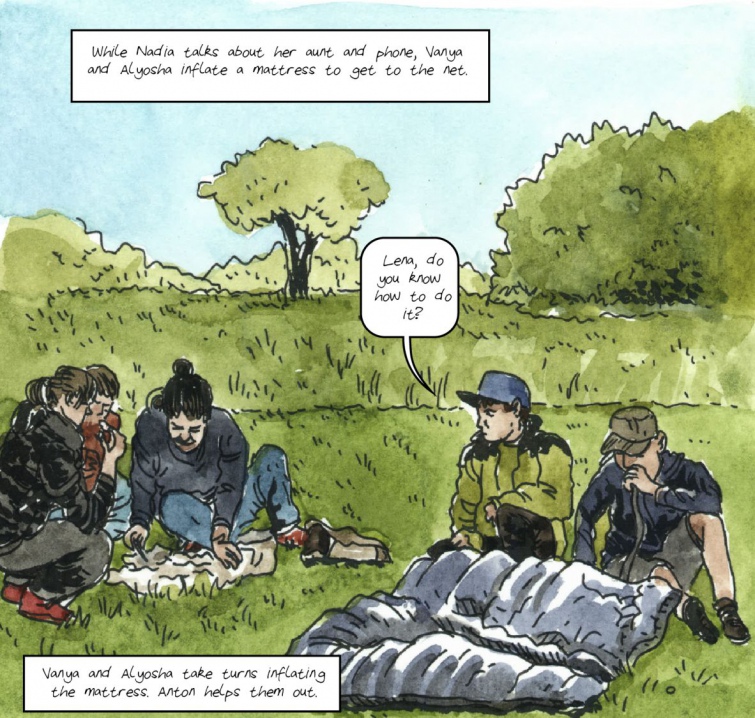 |
| © Dan Archer |
Lilya is silent all the time, and Nadia won't stop talking. Nadia wants to become a hairdresser. Almost all the girls in Donetsk villages want to become hairdressers.
But she doesn't want to study in Pokrovsk. She wants to go to Kyiv. That's what her brother tells her. Her brother is cool, he is in jail in Makiyivka, but he'll soon get out. Nadia thinks that she could go to Slovyansk.
She knows Slovyansk, but "not all of it", she says. She lived there for 4 months. In a shelter near the station. Mom behaved more or less, says Nadia, but dad drank like hell. But it's still better at home, notwithstanding the constant fighting. No one forces you to go to bed. Just one more year of suffering left.
Nadia likes to weave braids. She did Lena's. She cut her mother's hair. Twice. Nadia boasts of her manicure. Gel-lacquer. UAH 90. They do it in the village.
- Beautiful, - says Nadia.
- Beautiful, - says Lena.
On my recorder you can hear strong winds, frogs, birds and crickets. There are swans on the lake. A couple. And children on the mattress. Lyosha and Vanya, swimming for their fish.
They caught two fish today, but big ones. A carp and a pike perch. The pike-perch has big teeth. Everyone is amused.
- They'll fry one and sell the other, - Nadia sums up the catch.
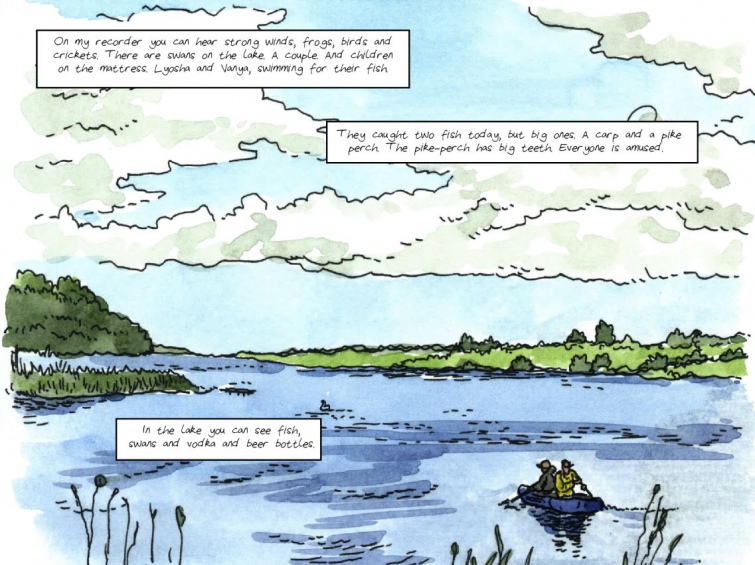 |
| © Dan Archer |
We'd already eaten the cake, played with the toys and even put the trash in the bag like Lena says.
In the lake you can see fish, swans and vodka and beer bottles.
- Let's take a drive! - says Anton.
He wants to go to London, Paris and America, but in the end we go to the playground, which was built here in Vozdvyzhenovka, and which Lena hasn't seen yet. Then over to Novooleksandrivka, the neighboring village where the school is located.
- Hello! - the children greet everyone they see.
We stop at a store in Novooleksandrivka and buy ice cream for all. While we eat, a bus that drives people from the farm approaches. Women exit the bus and enter the store. They come out with beer and sunflower seeds.
- People need to relax after work! - comments Nadia.
- Maybe we should have some wine, too? - jokes Anton.
... On the way from Vozdvyzhenovka to Avdiyivka we talk about Alyosha. About Nadia. The fact that the children have probably already tried alcohol. That they don't curse only when Lena's around, and maybe in front of the teachers.
Alyosha did not say a single word to us. Just that it's all good. No, he doesn't mind talking. He can even show you his fingers. Do you want him to?
I said no.
Lena says: I'm not worried about Lyosha. She has her arguments: firstly, Lyosha assumed responsibility for the younger children, and secondly, Lyosha likes to draw.
... I say that the children seem to be doomed by their environment. Here, alcohol's harm is greater than that of a detonator.
Lena talks of another world, which she hadn't noticed while living in Kyiv.
- It turns out that there is a bunch of people with other ideas about what's normal - for them, it's ok to live without electricity, it's ok to live without glass windows, to sell your gate... I don't wear a cloak of omnipotence: let me wash your faces and you will be like I want you to be. They have their own life where school is optional, and fish and cows are more important. The problem is alcohol.
Then she says: what can I give them except friendship?
- I can provide them communication, show them a different life. Myself as another person. Who lives differently. I can invite Taras Tomenko who's a director. You, a journalist.
After Vozdvyzhenovka, the word "director" sounds like a "astronaut".
... Near Avdiyivka Lena suddenly asks:
- Did they thank you?
I remind her that Nadia did. At once. The rest, I don't remember. Lena says:
- I don't like it when those you help get the feeling that they'll get everything anyway because they're poor children...
And immediately adds:
- Do you know what I dream about? Buying Alyosha a suit for graduation. And he should study. He should learn more. Because it's the future.
Lesya Ganzha, text
Project undertaken with the financial support of the Government of Canada provided through the Global Affairs Canada.